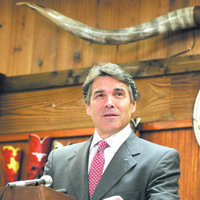Gov. Rick Perry can run, but he can’t hide
January 26, 2010
The role of a host is to be gracious, even to a would-be guest who spurns an invitation. Gov. Rick Perry says he won’t spend any time between now and the March 2 primary election talking with either the Star-Telegram Editorial Board or that of any other Texas newspaper. Although disappointed, we accept his decision.
Written by Editorial, Fort Worth Star-Telegram

The role of a host is to be gracious, even to a would-be guest who spurns an invitation. Gov. Rick Perry says he won’t spend any time between now and the March 2 primary election talking with either the Star-Telegram Editorial Board or that of any other Texas newspaper. Although disappointed, we accept his decision.
We’re disappointed not because we don’t get to spend an hour or so with the governor during the next five weeks. We’ve spent quite enough time with him during his almost two decades in statewide office (including nine years as governor) to get to know him. We’ve enjoyed his hospitality a few times at the Governor’s Mansion. We hope he has enjoyed ours when we have hosted him in Editorial Board meetings during his previous campaigns and years in office.
The source of our disappointment is not that his campaign strategy does not include us this time around. Any candidate who has to scramble for votes in an area as great and with such a diverse electorate as Texas has to make difficult time-management decisions.
We are disappointed that a man who was re-elected four years ago with the support of only 4 in 10 Texas voters would not be eager to explain his performance to those who have followed it closely. We did not recommend Perry to voters in 2006, but his blanket rejection of editorial board interviews this year, either in person or via telephone, includes boards from major Texas newspapers that did recommend him.
His objection, then, is not to us but to the concept of what editorial boards do in examining candidates for public office. There, he is wrong.
Perhaps the fault is in misperception. Perhaps he believes, as do some other people, that the purpose of newspaper editorials recommending one candidate over another is to tell readers how to vote.
That is not so; we write what we believe based on our efforts to educate ourselves on each candidate’s strengths, weaknesses and positions on pertinent issues.
We believe the value to editorial page readers is not in whether we recommend Candidate A or Candidate B, but in how well we can explain and support our position in what we write. These editorials should be fodder for thought, to be combined with voters’ other knowledge and beliefs leading to their own crucial decision as to how to mark a ballot.
Is our reasoning faulty? Do we ignore a candidate’s positives or overplay the negatives? We believe our readers are smart enough to judge what we write and then make up their own minds.
So where does that leave us with Perry? We’ll interview his opponents in the Republican primary. We’ll combine what we learn from them with what we know from the governor’s performance and from his publicly stated positions. We’ll make a recommendation in the race.
Perry’s campaign staff said it welcomes e-mailed questions but will answer them in writing and not via a telephone interview. We’re disinclined to accept that. Prepared answers, even if they are the governor’s own words, are not the same as a candidate having to think on his feet for follow-up questions.
The governor has made his decision. We believe our readers deserve better than what he has decided to provide. It’s our job to fill in the gaps. We’ll do that.
![]()
![]()
Related Stories
![]()
Fair Use Notice
This site contains copyrighted material the use of which has not always been specifically authorized by the copyright owner. We are making such material available in our efforts to advance understanding of environmental, political, human rights, economic, democracy, scientific, and social justice issues, etc. We believe this constitutes a "fair use" of any such copyrighted material as provided for in section 107 of the US Copyright Law. In accordance with Title 17 U.S.C. Section 107, the material on this site is distributed without profit to those who have expressed a prior interest in receiving the included information for research and educational purposes. For more information go to: http://www.law.cornell.edu/uscode/17/107.shtml. If you wish to use copyrighted material from this site for purposes of your own that go beyond "fair use", you must obtain permission from the copyright owner.